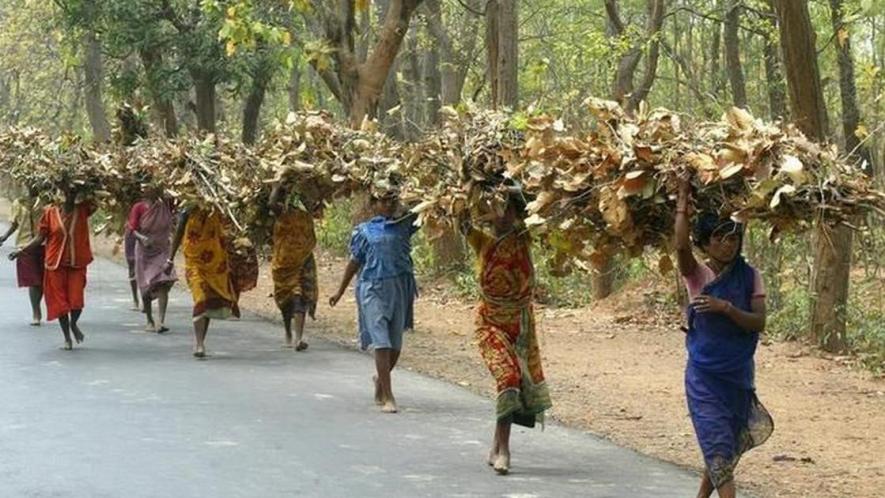How Draft EIA Notification Compromises Rights of Tribal and Forest Dwelling Communities

Representational image. | Image Courtesy: Scroll.in
New Delhi: While the draft Environment Impact Assessment Notification, 2020 has been criticised for attempting to dilute environmental norms for the sake of easing business, the sections of society that stand to suffer the most on account of the new provisions are the marginalised populations living in forest areas, that is, the scheduled tribes and other traditional forest dwellers. Post facto clearances for projects, which are sought to be regularised after the new notification comes into effect, are set to compromise various rights of the indigenous population as guaranteed under statutes and Acts of Parliament.
The draft notification seeks to dilute the concept of public consultations, which lies at the core of the Environment Impact Assessment process, for a large number of projects. These projects include those listed under Category B2, 40 different industries under Clause 26, factories within notified industrial estates, projects pertaining to defence and national security, construction of elevated roads, building construction, and modernisation of irrigation projects amongst others.
As per activists, rights conferred upon scheduled tribes and other traditional forest dwellers granted under Forest Rights Act (FRA), 2006 and the PESA Act, 1996, which is an acronym for Panchayats (Extension to the Scheduled Areas) Act,1996, will be compromised if certain projects are exempted from public hearing.
“The exemptions to public hearings will adversely affect the rights of forest dwellers to conserve, manage and protect forests, their right to minor forest produce and their access to biodiversity which have been guaranteed under the Forest Rights Act, 2006. It will also affect the Gram Sabha’s power to fully exercise its powers under Section 5 of the Act. Consent of Gram Sabhas for diversion of forest land for non-forest purposes is statutory under the law following the landmark judgement of the Supreme Court in the Niyamgiri Mining Case of Odisha,” said Bhubaneshwar-based independent researcher Tushar Das.
Section 5 of the Forest Rights Act, 2006 bestows the power upon Gram Sabhas to regulate access to community forest resources and stop any activity which adversely affects wild animals, forest, and biodiversity.
The consent of Gram Sabhas had been established as a statutory right in the Niyamgiri Mining Case, wherein the Supreme Court had, in an order delivered in April 2013, directed Odisha Mining Corporation to obtain ‘consent’ of 12 Gram Sabhas – seven in the Rayagada district and five in the Kalahandi district – before proceeding with bauxite mining in the region. Earlier, in the year 2009, the Union Ministry of Environment & Forests (MoEF), as it was called back then under the Congress-led United Progressive Alliance government, had issued a notification wherein consent of Gram Sabhas had been made mandatory for all projects that sought to divert forest land for non-forest activities.
Rights guaranteed to Gram Sabhas under Schedule 5 and Schedule 6 of the Constitution of India are likely to be violated when the draft notification comes into effect. In order to safeguard the rights of indigenous populations, certain areas in the country are enlisted under Schedule 5 and Schedule 6 where communities belonging to Schedule Tribes have autonomy in the administration and control of land, forests, and natural resources. In order to guarantee the rights conferred upon populations living in areas listed under these two schedules, the Parliament had enacted the PESA Act in 1996.
“The draft notification extends the standard operating procedure for procuring environmental approvals, which will be adopted across the country, to any project irrespective of its administrative or geographical location. This would lead to violation of rights and special powers guaranteed to Gram Sabhas under the fifth and sixth schedule provisions of the Constitution as well as PESA. The PESA Act empowers a Gram Sabha to prevent alienation of land and to approve plans and projects. It is also mandatory to consult with a Gram Sabha before acquiring land for developmental projects and resettling project-affected people,” added Dash.
By the midnight of August 11, the Union Ministry of Environment, Forests & Climate Change (MoEF&CC) had received as many as 17 lakh objections and recommendations for the draft notification, when the deadline came to a close. A number of these objections reportedly pertain to the fact that sections of indigenous population will be short-changed of their rights after the notification comes into effect.
“The draft notification clearly misses the social aspect of development and hence it is flawed right from the beginning. In areas dominated by tribal population, relevant Acts of the Parliament should be dovetailed together for a project to get social licence as distinct from an environment clearance. The concept of post facto clearances goes against the very spirit of the precautionary principle. The notification will spell doom for indigenous populations of the country. The government’s concern for indigenous population can be gauged from the fact that the notification was never published in all 22 regional languages,” said Rebbapragada Ravi, Chairperson of mm&P (mines, minerals and PEOPLE), an alliance of individuals, institutions, and communities who are concerned and affected by mining.
On August 11, that is, on the last day for registration of objections and recommendations to the draft notification, the Delhi High Court issued notice to the MoEF&CC to reply to a plea, filed by environmental activist Vikrant Tongad, seeking contempt proceedings against the ministry for not publishing the draft notification in all 22 languages enlisted in the Eighth Schedule of the Constitution. On June 30, the High Court had issued directions upon the ministry to publish the document in 22 regional languages in order to ensure its publicity across all parts of the country.
“The draft notification will have wide and far-reaching implications upon a majority of the population in the country including those belonging to Scheduled Tribes. Our simple plea to the ministry was to ensure its publication in all 22 languages which was not followed despite an order of the Delhi High Court,” Tongad told NewsClick.
The writer is an independent journalist.
Also read: World Elephant Day: Unsafe Future of Odisha’s Elephants
Get the latest reports & analysis with people's perspective on Protests, movements & deep analytical videos, discussions of the current affairs in your Telegram app. Subscribe to NewsClick's Telegram channel & get Real-Time updates on stories, as they get published on our website.
























